New Chancellor Mark Hagerott's Challenge: Restoring Trust And Integrity In Universities

On July 1 Mark Hagerott took over as the Chancellor of the North Dakota University System. One of his first tasks was to launch a listening tour around the state. While in Minot to meet with some area leaders he was kind enough to make a little time for me.
Hagerott asked that parts of our conversation be off the record as he wanted to speak candidly about ideas he has for the universities which aren’t fully formed yet and ready for public consumption. I agreed as I did want him to speak candidly and, frankly, just over two weeks into the job there’s not much he can speak to yet beyond generalities.
For my part, I tried to impress upon Hagerott the need to restore a sense of trust and integrity in the universities. Trust that they are operating to serve the State of North Dakota and its students and not just campus or parochial interests, and the integrity in that university officials should be someone we can trust to be honest dealers with the public and state leaders.
[mks_pullquote align=”right” width=”300″ size=”24″ bg_color=”#000000″ txt_color=”#ffffff”]The measure of Hagerott’s success will be the degree to which he can change the priorities of the universities.[/mks_pullquote]
Because these are things that have not been true over at least the last several years.
Hagerott told me that he’d like to bring efficiency to the universities, and I told him one area he could start is putting an end to the legal and political maneuvering around transparency. After a meeting I emailed him a copy of a November opinion issued by Attorney General Wayne Stenehjem at my request which accused the universities of putting in more time trying to avoid transparency than adhering to open records/open meeting laws.
“I am concerned with the SBHE’s continual attempts to dismiss the duty to follow the statutory requirements of the open meetings law,” Stenehjem wrote in the opinion.
“The SBHE often seems to devote an inordinate amount of time creating unsupportable legal arguments to justify violations of the open records and meetings law after the fact,” he continued. “Devoting the same efforts to assure compliance before violations occur could go a long way to avoid these unnecessary and embarrassing incidents in the future.”
Those words sum up, in a nutshell, much of what ails the university system. Many of the officials in the system, particularly certain presidents at certain research institutions, foster a hostile and combative relationship with lawmakers and members of the public seeking transparency and accountability. This ties up a lot of resources in petty political squabbling, and serves as a major distraction to the educational mission of the campuses.
The measure of Hagerott’s success will be the degree to which he can change the priorities of the universities. If he can get the campuses to embrace transparency and disclosure over deception and obfuscation, if he can get the campuses to emphasize their value to students and the state over bloating power, payroll, and campus square footage, he’ll have done a great service to North Dakota.
If he can’t, he’ll have changed little in a university system which desperately needs reform.




